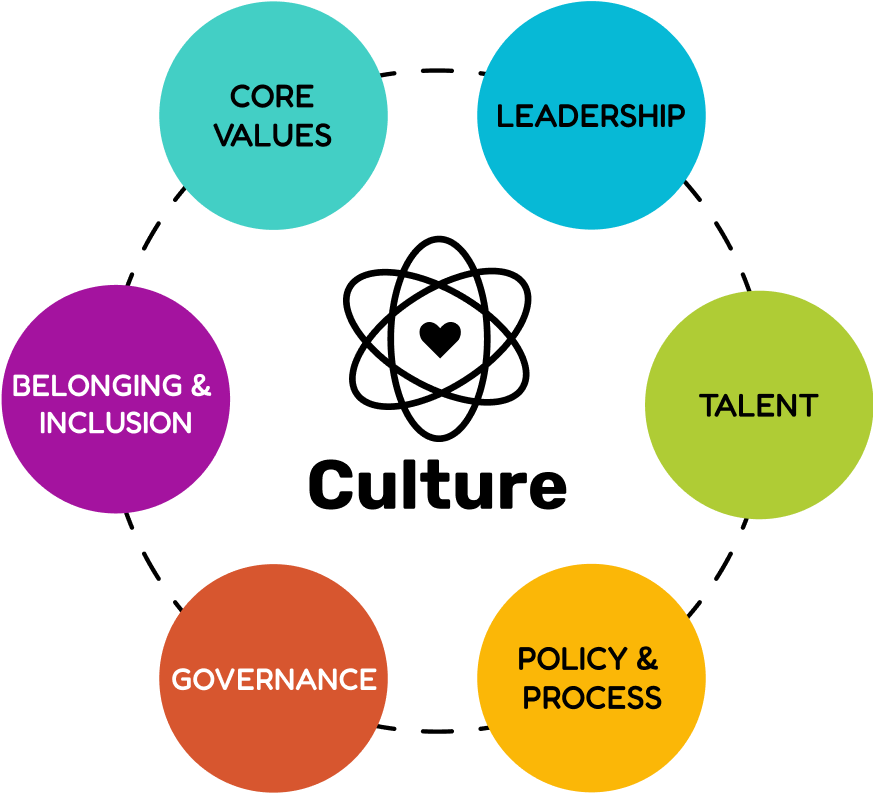
Organizational culture
Organizational culture and performance are inseparable
Culture powers your organization. Companies that create a healthy culture and foster an inclusive workplace engage employees, drive performance, and accelerate mission success. We partner with you to hone your culture and, in turn, bring your strategy to life.
Read our latest article: How to stop a toxic work environment at its source

How we help
Transform organizational culture
Whether you’re looking to define your culture, engage employees in putting core values into practice, build a workplace of inclusion and belonging, or identify and remedy the effects of a toxic culture, we can help you find the direct line from culture to business success. Fostering a great culture isn’t just the right thing to do for your people – it’s good for business – promoting innovation, performance, and competitiveness. Our culture solutions provide leaders with the strategies, infrastructure, and accountability measures to drive true culture transformation.
Eagle Hill’s culture transformation approach

How our culture solutions create lasting impact
We look beyond core values and employee behaviors to enterprise-wide structures needed to reach and sustain your best culture. Our culture experts partner with you to identify and address challenges across your culture ecosystem with solutions including:
- Organizational culture assessment
- Core values strategy
- Inclusive talent strategies
- Strategic culture investment analysis and planning

Why Eagle Hill
We combine years of industry-leading research, award-winning culture success, and deep change management expertise to bring clients insights and practical support for their organizational culture transformation.

Data-driven culture expertise: Eagle Hill has over a decade of proprietary research on industry and talent issues that impact organizational culture. Our work as culture champions allows us to bring you relevant and effective culture solutions backed by deep data and real-world thinking.

Stop challenges at their source: Organizational cultures are complex ecosystems impacted by leadership, talent strategy, policies, governance, employee behaviors, and more. Our culture experts identify and address the drivers of your culture challenges – no matter where they’re hiding.

Sustain change beyond behaviors: Culture is led by more than behaviors alone. We help you solidify the necessary governance, structures, accountability, and skill sets to sustain culture change.

Move from vision to reality: A healthy culture requires moving core values off the page and into practice. Our change management and talent experts support implementation across the employee lifecycle and ensure your organization’s culture accelerates your mission and goals.
Why care about organizational culture?
A strong culture is important to more than just your employees – it can make or break your strategy. Organizations with inclusive cultures are more likely to be innovative, have better reputations, and higher retention.
Culture impacts employees’…
73%
Will to do their best work
72%
Productivity and efficiency
69%
Commitment to organizational strategy
Source: Eagle Hill Consulting Organizational Culture Survey, 2023
Companies with good cultures have…
3X
Better performance
50%
Less turnover
4X
More engaged employees


Culture can make or break your strategy. Do you know where your culture stands?
Organizational culture insights
Keep your finger on the pulse of trends impacting work culture and employee experience with actionable insights and best practices based on our proprietary research.
Report
The state of organizational culture 2024: Hybrid work’s unexpected impact
Our 2024 organizational culture report finds hybrid work is having a positive impact on organizational culture. Read the report to learn why and get 4 recommendations on how to improve your organization's culture as you navigate hybrid work.
Article
Positioning government leaders as culture champions
Government leaders need training, tools, and data to prioritize and build a strong workplace culture. Learn what agencies can do to position government leaders as culture champions who employees will be more likely to trust and follow.
Article
Toxic work environments: How to stop your toxic culture problems at their source(s)
We share recommendations to fix a toxic work environment and create a thriving workplace where employee morale and productivity flourish.
Organizational culture case studies
Here are a few examples of how we provide impact for our clients. From defining core values to effectively implementing culture change, our years of creative and strategic experience have helped clients across industries reach their potential.
Federal government
Culture change unifies a federal agency
We helped map and implement a federal agency's culture change to a value-driven culture led by fairness, accountability, integrity, and respect.
Federal government
Developing competency models and workforce planning
We helped one highly specialized agency prepare their workforce for the future by implementing their forward-looking Human Capital Strategic Plan. Eagle Hill’s Mary Dalrymple, Director of Services and Innovation, explains how.
Technology, media, and entertainment
Helping core values take hold
A large nonprofit saw core values as the key to staying competitive in the future—but the new values weren’t taking hold with employees. We created a plan to bring their desired culture off the pages of HR strategy and into day-to-day work life.

